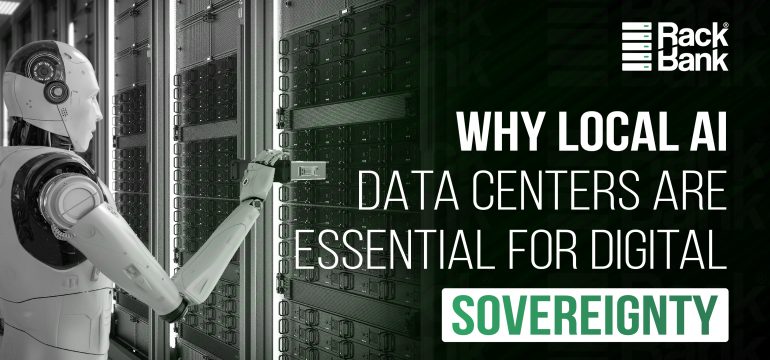Introduction
India stands at the threshold of a digital revolution, driven by rapid advances in Artificial Intelligence (AI), cloud computing, and an ever-expanding digital economy. As the world’s largest democracy, India’s digital footprint is massive, with hundreds of millions of citizens generating and consuming data daily. In this context, the emergence of local AI data centers is not just a technological necessity but a strategic imperative for ensuring digital sovereignty. The importance of AI datacenters, data localization India, and robust AI infrastructure in India cannot be overstated as they underpin the nation’s ambitions to become a global digital powerhouse.
This blog explores why local AI data centers are crucial for digital sovereignty, how they support compliance with government data regulations, and their role in securing India’s digital future. We will also examine the benefits of data localization for AI, the impact of digital sovereignty on AI innovation, and how data center solutions for AI startups in India are shaping the country’s technological landscape.
The Foundation: Understanding Digital Sovereignty
Digital sovereignty refers to a nation’s ability to control its digital infrastructure, data, and technology ecosystem. For India, this means ensuring that sensitive data, especially that which pertains to citizens, government, and critical industries, remains within its borders and is governed by local laws and regulations. The concept is closely tied to data residency laws, government policies on AI and data hosting India, and the need for AI compliance in India.
Why Digital Sovereignty Matters
- National Security: Prevents foreign entities from accessing or controlling critical data.
- Economic Growth: Retains value generated by data within the country, boosting the local economy.
- Cultural Relevance: Enables the development of AI models and digital solutions tailored to Indian languages and societal needs.
- Legal Compliance: Ensures adherence to data residency laws and government data regulations such as the Digital Personal Data Protection Act, 2023.
The Rise of Local AI Data Centers in India
Current Landscape
India’s data center industry has witnessed exponential growth, with investments exceeding $60 billion by 2024 and projections of over $100 billion by 2027. Major cities like Mumbai, Chennai, Hyderabad, and Bengaluru have become hubs for Indian data centers, while Tier-II cities are emerging as new destinations for edge computing in India.
Key Features of Modern AI Data Centers
- Designed for AI/ML workloads: High-performance GPUs, scalable storage, and advanced networking.
- Shared economy approach: Reduces costs by up to 30% through resource pooling.
- Sustainability: Integration of renewables and green technologies, as seen in RackBank’s GigaCampus.
- Carrier neutrality: Direct connectivity to landing stations and robust interconnects.
- Rapid deployment: Contract to commissioning in as little as nine months.
Growth Drivers
- AI and Cloud Adoption: Surging demand for AI cloud services India and digital transformation across industries.
- Regulatory Push: Data localization India and digital sovereignty and data localization laws are compelling global and local enterprises to store and process data within the country.
- Government Initiatives: The IndiaAI Mission, with a budget of over ₹10,000 crore, aims to build indigenous AI infrastructure in India and promote responsible AI development.
Data Localization: The Bedrock of Digital Sovereignty
What is Data Localization?
Data localization mandates that data generated within India, especially personal and sensitive information, must be stored and processed within the country. This is a cornerstone of digital sovereignty and is enshrined in recent laws and regulations.
Benefits of Data Localization for AI
- Enhanced Data Security India: Local storage reduces risks of foreign surveillance and unauthorized access.
- Faster AI Innovation: AI models can be trained on diverse, locally relevant datasets, improving accuracy and relevance.
- Regulatory Compliance: Simplifies adherence to AI compliance India and government data regulations.
- Economic Advantage: Stimulates investment in data center India infrastructure, creating jobs and boosting the economy.
How Digital Sovereignty Affects AI Innovation
Tailored AI Solutions for India
AI systems trained on Indian data are more effective in addressing local challenges—be it language diversity, agriculture, healthcare, or public services. For instance, speech recognition models must understand Indian accents and regional languages, which is only possible with localized data and infrastructure.
Ethical and Responsible AI
Local control enables the embedding of Indian ethical standards, cultural values, and legal frameworks into AI systems, ensuring responsible and inclusive AI development.
Reducing Latency and Improving Performance
Edge computing in India—processing data closer to the source—reduces latency, enhances user experience, and is vital for time-sensitive applications like autonomous vehicles, healthcare diagnostics, and financial services.
The Strategic Role of AI Data Centers in National Security
Safeguarding Critical Data
AI data centers play a pivotal role in national security by ensuring that sensitive data related to defense, intelligence, and governance remains within India’s jurisdiction. This is crucial for:
- Real-time analytics: Supporting surveillance, disaster response, and cyber defense.
- Predictive intelligence: Enabling proactive threat detection and response.
- Resilience: Reducing dependency on foreign infrastructure, which could be subject to geopolitical risks.
Data Center Solutions for AI Startups in India
Empowering Innovation
Data center colocation and cloud-based AI services provide startups with affordable access to high-performance computing, storage, and networking, leveling the playing field against global competitors.
Supporting the Digital India Mission
By enabling startups to build, test, and deploy AI solutions locally, local data centers are integral to the Digital India mission—fostering innovation, job creation, and digital inclusion.
Government Policies on AI and Data Hosting in India
Policy Landscape
- Digital Personal Data Protection Act, 2023: Mandates data localization and strengthens data privacy and security.
- IndiaAI Mission: Focuses on building sovereign AI infrastructure, supporting startups, and developing indigenous AI models.
- Incentives for Data Centers: Subsidies, tax breaks, and regulatory support for setting up India data centers and AI infrastructure in India.
Compliance and Regulation
Strict AI compliance India requirements ensure that AI systems are transparent, accountable, and aligned with national interests. This fosters trust among users and stakeholders, driving broader adoption of AI technologies.
Building Sovereign AI Infrastructure in India
The GigaCampus Model
RackBank’s GigaCampus exemplifies the next generation of AI data centers—scalable, sustainable, and designed for hypergrowth. Key features include:
- From 0 to 100 MW in a single campus: Supporting massive AI and ML workloads.
- 100% clean energy: Achieving sustainability goals without premium costs.
- Industry-leading SLAs: Ensuring 100% availability and reliability.
Collaboration and Ecosystem Development
Partnerships with global technology leaders, green engineering firms, and construction companies are vital for building world-class Artificial Intelligence infrastructure in India.
Importance of Local Data Centers in the Digital India Mission
Driving Digital Inclusion
Local data centers ensure that digital services are accessible, affordable, and reliable across urban and rural India. This is essential for bridging the digital divide and achieving the goals of the Digital India mission.
Economic and Social Impact
- Job Creation: The data center industry is expected to create 1–2 million direct jobs and millions more indirectly by 2030.
- Investment Magnet: India could attract up to $400 billion in investments by expanding its data center capacity to 40 GW by 2030.
- Global Leadership: By leveraging its digital strengths, India can become a global hub for data processing, AI innovation, and cloud services.
The Future: Trends and Opportunities
Edge Computing and Tier-II Cities
The rise of edge computing in India is driving the development of smaller, distributed data centers in Tier-II cities, bringing compute power closer to users and enabling real-time AI applications in sectors like healthcare, agriculture, and smart cities.
GenAI and Real-Time Processing
The growth of Generative AI is pushing data center operators to invest in advanced infrastructure capable of handling massive compute and storage demands. Real-time processing will become the norm, necessitating further expansion of local data centers.
Growth of India’s Data Center Market (2024–2033)
Below is a graph illustrating the projected growth of the India data center market from 2024 to 2033, highlighting the rapid expansion driven by AI, data localization, and digital transformation initiatives.
Conclusion
Local AI data centers are the linchpin of India’s quest for digital sovereignty. They empower the nation to control its digital destiny, protect sensitive data, comply with evolving regulations, and foster AI innovation that is uniquely Indian. As the digital economy continues to expand, investing in robust, secure, and scalable AI infrastructure is not just a business necessity—it is a national imperative. By building and leveraging local data centers, India is poised to lead the global digital revolution while safeguarding its sovereignty, security, and future prosperity.


Leave a Reply
You must be logged in to post a comment.